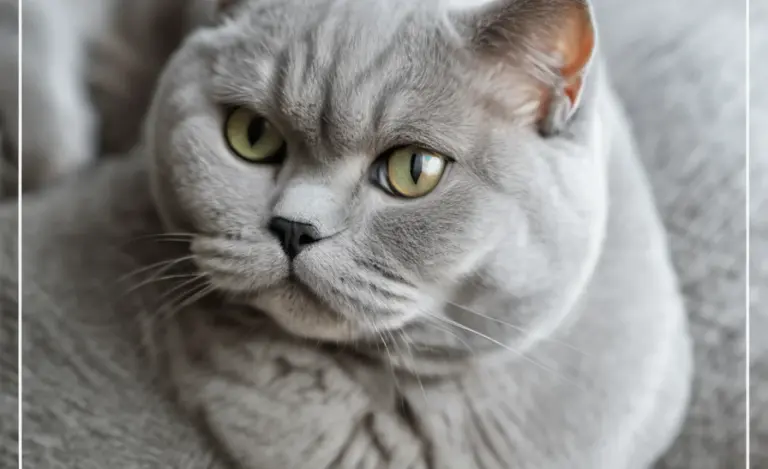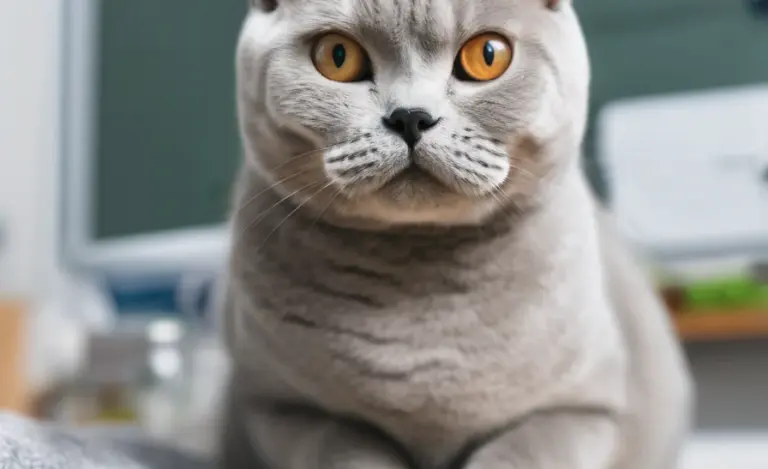Can Vaccinations Prevent Illness in British Shorthairs? Smart Tips
Quick Summary:
Yes, vaccinations are vital for protecting your British Shorthair from several serious and potentially fatal diseases. Core vaccines, like those for feline panleukopenia, feline calicivirus, and feline herpesvirus, are highly recommended for all cats. Consult your vet to create a vaccination schedule tailored to your cat’s specific needs and lifestyle.
Bringing a British Shorthair into your life is such a joy! These gentle, affectionate cats make wonderful companions. As a dedicated owner, keeping your British Shorthair healthy is a top priority. It’s natural to wonder how best to protect them from illness. One of the most effective ways to do this is through vaccination.
Vaccinations can seem a bit daunting, but they’re a cornerstone of preventative care. In this guide, I’ll walk you through everything you need to know about vaccinations for your British Shorthair. We’ll cover which vaccines are essential, how they work, and what to expect during the vaccination process, ensuring your furry friend stays happy and healthy for years to come.
Understanding the Importance of Vaccinations
Vaccinations are a critical part of your British Shorthair’s healthcare. They work by exposing your cat to a weakened or inactive form of a disease-causing organism. This stimulates their immune system to produce antibodies, which are like tiny soldiers that recognize and fight off the real disease if your cat is ever exposed to it.
Think of it as building a shield against invisible enemies. Without vaccinations, your British Shorthair is vulnerable to several dangerous and potentially deadly diseases. The good news is that vaccinations are very effective and can provide long-lasting protection. According to the RSPCA, vaccinations are a simple and effective way to protect your pet from a range of diseases.
Core Vaccines for British Shorthairs
Core vaccines are those recommended for all cats, regardless of their lifestyle. These vaccines protect against diseases that are widespread, serious, and potentially fatal. The core vaccines for British Shorthairs include:
- Feline Panleukopenia (Feline Distemper): This highly contagious viral disease causes severe vomiting, diarrhea, fever, and can be fatal, especially in kittens.
- Feline Calicivirus (FCV): This virus causes upper respiratory infections, oral ulcers, and can lead to pneumonia.
- Feline Herpesvirus (FHV-1): Also known as feline viral rhinotracheitis, this virus causes upper respiratory infections, sneezing, runny nose, and eye infections.
- Rabies: A fatal viral disease that affects the central nervous system. Rabies is transmitted through the saliva of infected animals and is a public health concern.
Non-Core Vaccines for British Shorthairs
Non-core vaccines are recommended based on your cat’s individual risk factors, such as their lifestyle and geographic location. Your veterinarian can help you determine if any of these vaccines are necessary for your British Shorthair:
- Feline Leukemia Virus (FeLV): This virus weakens the immune system and can lead to cancer and other serious health problems. It’s recommended for cats that go outdoors or live with other cats.
- Feline Immunodeficiency Virus (FIV): This virus also weakens the immune system and can lead to various health problems. There is some debate about the efficacy of the FIV vaccine, so discuss it with your vet.
- Chlamydophila felis: This bacteria causes conjunctivitis (eye infection) and upper respiratory infections. It’s typically recommended for cats in multi-cat environments or shelters.
- Bordetella bronchiseptica: This bacteria causes respiratory infections, especially in kittens and cats in shelters or boarding facilities.
Vaccination Schedule for British Shorthair Kittens
Kittens are most vulnerable to infectious diseases because their immune systems are still developing. It’s crucial to start their vaccination series at the right age to provide them with the protection they need. Here’s a typical vaccination schedule for British Shorthair kittens:
| Age | Vaccine |
|---|---|
| 6-8 weeks | First FVRCP (Feline Viral Rhinotracheitis, Calicivirus, Panleukopenia) |
| 10-12 weeks | Second FVRCP, FeLV (if recommended) |
| 14-16 weeks | Third FVRCP, Rabies, FeLV (if recommended) |
Booster Vaccinations: After the initial kitten series, your British Shorthair will need booster vaccinations to maintain their immunity. The frequency of booster vaccinations depends on the vaccine and your veterinarian’s recommendations. Generally, FVRCP boosters are given every 1-3 years, and rabies boosters are given every 1-3 years, depending on local regulations.
Vaccination Schedule for Adult British Shorthairs
If you’ve adopted an adult British Shorthair and don’t have their vaccination history, it’s best to start them on a vaccination series as if they were kittens. Your veterinarian can help you determine the appropriate schedule based on their age and health status.
| Vaccine | Schedule |
|---|---|
| FVRCP | Two doses, 3-4 weeks apart, then booster every 1-3 years |
| Rabies | One dose, then booster every 1-3 years, depending on local regulations |
| FeLV (if recommended) | Two doses, 3-4 weeks apart, then annual booster |
What to Expect During the Vaccination Appointment
Taking your British Shorthair for vaccinations is usually a straightforward process. Here’s what you can expect:
- Veterinarian Examination: Your vet will perform a physical exam to ensure your cat is healthy enough to receive the vaccines.
- Vaccine Administration: The vaccines are usually given as injections under the skin.
- Observation Period: Your vet may want to observe your cat for a short period after the vaccination to monitor for any immediate reactions.
- Follow-up: Schedule the next vaccination appointment according to the recommended schedule.
Potential Side Effects of Vaccinations
Vaccinations are generally safe, but like any medical procedure, there is a risk of side effects. Most side effects are mild and temporary, such as:
- Soreness at the injection site
- Mild fever
- Lethargy
- Decreased appetite
These side effects usually resolve within 24-48 hours. In rare cases, more serious side effects can occur, such as:
- Allergic reaction (hives, facial swelling, difficulty breathing)
- Injection-site sarcoma (a type of cancer)
If you notice any signs of an allergic reaction, seek veterinary attention immediately. Injection-site sarcomas are rare, but it’s important to monitor the injection site for any lumps or swelling that persist for more than a few weeks. If you’re concerned about potential side effects, discuss them with your veterinarian.
Addressing Common Concerns About Vaccinations
It’s natural to have questions and concerns about vaccinations. Here are some common concerns and their answers:
- “Are vaccines really necessary?” Yes, vaccines are essential for protecting your British Shorthair from serious and potentially fatal diseases.
- “Can vaccines cause my cat to get sick?” Vaccines can cause mild side effects, but they don’t cause the actual disease. The benefits of vaccination far outweigh the risks.
- “Are there alternatives to vaccination?” There are no proven alternatives to vaccination. While good nutrition and hygiene are important for overall health, they don’t provide the specific immunity that vaccines offer.
- “Can I skip vaccinations if my cat stays indoors?” Indoor cats are still at risk of exposure to infectious diseases. Viruses can be carried inside on your shoes or clothing, or through open windows.
- “How long do vaccines last?” The duration of immunity varies depending on the vaccine. Your veterinarian can advise you on the appropriate booster schedule.
Tips for a Stress-Free Vaccination Experience
Some cats can get stressed during vet visits. Here are some tips to make the vaccination experience as stress-free as possible for your British Shorthair:
- Use a cat carrier: Get your cat used to the carrier by leaving it out in the house with a comfortable blanket inside.
- Bring familiar items: Bring your cat’s favorite blanket or toy to the vet appointment to provide comfort.
- Stay calm: Cats can sense your stress, so try to stay calm and relaxed during the visit.
- Reward your cat: Give your cat a treat or some praise after the vaccination to create a positive association.
The Cost of Vaccinations
The cost of vaccinations can vary depending on your location, the type of vaccine, and your veterinarian’s fees. Core vaccines typically cost between $75 and $100 per dose, while non-core vaccines may cost slightly more. It’s important to factor in the cost of vaccinations when budgeting for your British Shorthair’s healthcare. Many veterinary clinics offer wellness packages that include vaccinations and other preventative care services at a discounted rate. Additionally, pet insurance can help cover the cost of vaccinations and other veterinary care.
Record Keeping
Keeping accurate records of your British Shorthair’s vaccinations is essential. Your veterinarian will provide you with a vaccination certificate or record that lists the vaccines your cat has received and the dates they were administered. Keep this record in a safe place and bring it with you to all veterinary appointments. You may also need to provide proof of vaccination when boarding your cat or traveling with them.
You can also use digital tools to keep track of your cat’s vaccinations. Several pet care apps and websites allow you to store your cat’s medical records, including vaccination information. These tools can send you reminders when it’s time for booster vaccinations and make it easy to share your cat’s medical history with other caregivers.
The Link Between Vaccinations and a Healthy British Shorthair
Vaccinations are a cornerstone of preventative healthcare for your British Shorthair. By protecting your cat from serious infectious diseases, vaccinations help ensure they live a long, healthy, and happy life. When combined with a balanced diet, regular exercise, and routine veterinary care, vaccinations can help your British Shorthair thrive.
Remember, every cat is unique, and their vaccination needs may vary. Work closely with your veterinarian to develop a vaccination plan that is tailored to your British Shorthair’s individual lifestyle and risk factors. Together, you can ensure your furry friend receives the best possible protection against preventable diseases.
FAQ About Vaccinations for British Shorthairs
1. What are the most important vaccines for my British Shorthair kitten?
The most important vaccines for kittens are the core vaccines: FVRCP (feline viral rhinotracheitis, calicivirus, and panleukopenia) and rabies. These protect against common and serious diseases.
2. How often do adult British Shorthairs need booster shots?
Adults usually need FVRCP boosters every 1-3 years and rabies boosters every 1-3 years, depending on the vaccine type and local regulations. Your vet will advise on the best schedule.
3. Can my indoor-only British Shorthair skip vaccinations?
Even indoor cats need vaccinations. Diseases can be brought inside on shoes or clothing, so it’s best to keep them protected.
4. What are the signs of a vaccine reaction in my cat?
Mild reactions include soreness, slight fever, or tiredness. Serious reactions, like trouble breathing or swelling, need immediate vet attention.
5. How much do cat vaccinations typically cost?
Vaccination costs vary, but expect to pay $75-$100 per dose for core vaccines. Some clinics offer packages for better value.
6. Is there an alternative to traditional cat vaccinations?
No scientifically proven alternatives to vaccines exist. Good care helps overall health, but only vaccines give specific disease immunity.
7. What should I do if I don’t have my cat’s vaccination records?
If you don’t have records, it’s safest to start a new vaccination series. Your vet can help determine the right schedule for your cat’s age and health.
Conclusion
Vaccinations are an act of love. By taking the time to understand the importance of vaccinations and working with your veterinarian to create a personalized vaccination plan, you’re giving your British Shorthair the best possible chance at a long, healthy, and happy life. Remember, a vaccinated cat is a protected cat, and a protected cat is a happy cat. The International Cat Association (TICA) also recommends regular veterinary checkups and vaccinations to ensure your cat’s well-being. So, schedule that appointment today and give your British Shorthair the gift of health!





